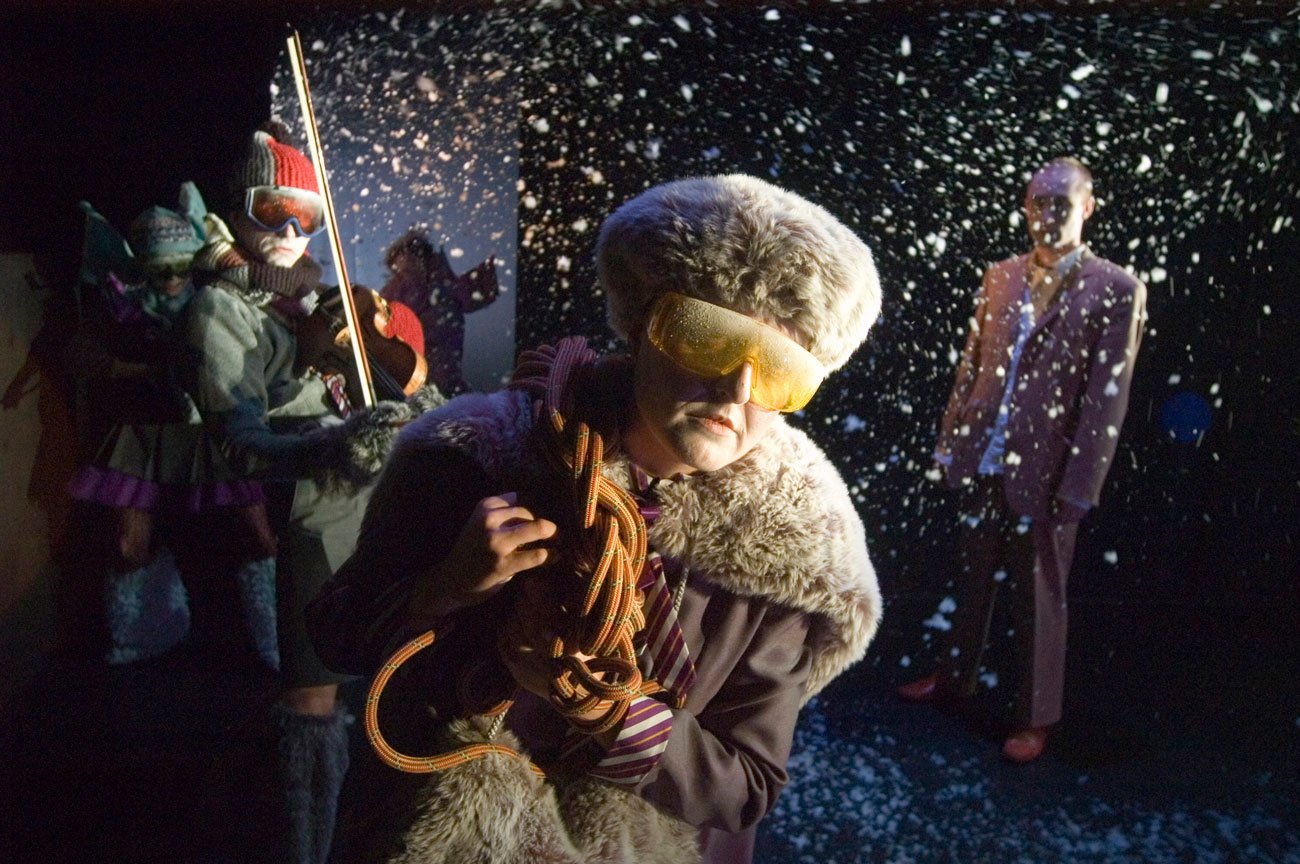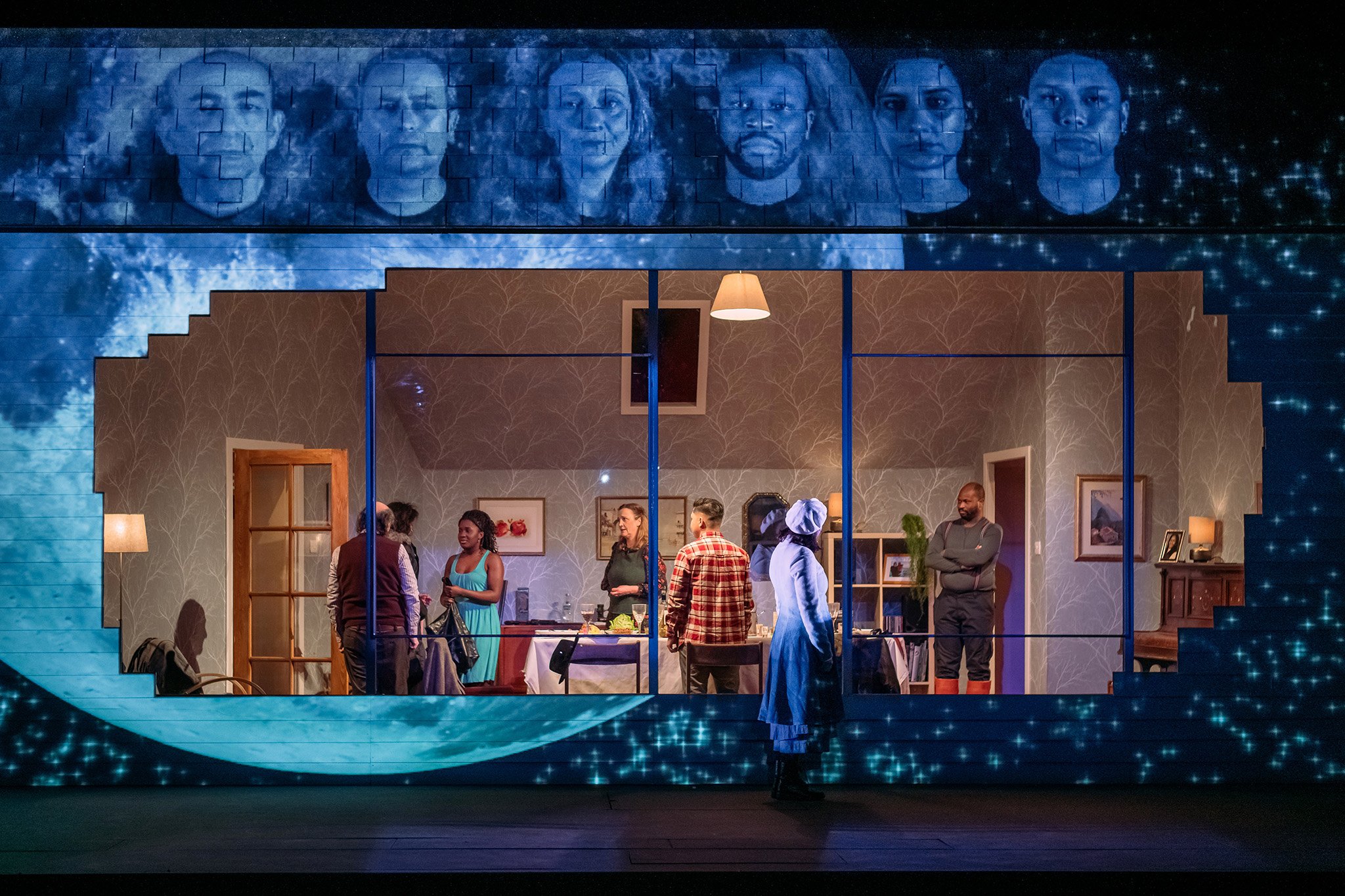
“Inside…outside…nowhere is home…”
[5:15 The Who]
By Douglas Maxwell, March 2020.
You would think that after twenty years as a professional playwright I’d know what the word ‘theatrical’ means. But every time I settle on an all-encompassing definition another example pops up and the whole thing slips from my grip.
Surely ‘theatrical’ just means a performance arresting enough to hold the attention of a theatre full of people? Generally, in that sense, we’re talking spectacle: colour, character and volume; big, broad-stroke stories which hit home for a crowd rather than for an individual; metaphor, music, light and a touch of pageantry here and there.
Recently though I asked a TV producer what they meant when they described a script of mine as being ‘theatrical’ and they said “it’s code for ‘too much fucking talking’”. Then again, a film director was pitching me a project that they said was going to be ‘theatrical’, which turned out to mean it was set entirely in one room and the characters barely spoke.
The older I get the more I think that ‘theatrical’ has less to do with what’s happening on the stage than what’s happening in the audience.
In the cinema we lean back and wait to be swept away to another world – our field of vision full, our freewill gladly given over. We can drift off in front of the TV too. We want to disappear into a story. But in a theatre you can never disappear. Your presence is required. A play needs an audience’s active attention or it isn’t a play – it isn’t even a piece of art, it’s nothing. So we lean forwards as we watch a good play, not back.
A play isn’t trying to sweep us away, it’s calling us to attention.
And watching a piece of theatre takes a lot of attention because we’re actually watching two shows at the same time. The first is the performance up on the stage: an act, a fake. We know that that’s not a real king or a real gun or real words that a real person would actually say in real life. We can still see the stage and understand all the effort of the production. We can still see and feel the audience around us. It’s always pretend.
The second show though – a simultaneous version, existing somewhere between our eye and the actor’s body – is our own version of the story: playing out live in our imagination, but set in the real world.
For the first show we’re on the outside looking in…for the second, we’re on the inside looking out.
Two shows at the same time…
Grand theatricality, visual and noisy… intimate theatricality, silent and contained…
Outside looking in….
Inside looking out….
Ladies and Gentlemen, I give you…Vanishing Point.
The Beggar’s Opera
In the Scottish theatre scene Vanishing Point are both inside and out.
As for being insiders…they perform on Scotland’s big stages and always attract a very large audience. (I’ve always been quite jealous of their audience. Not just that there are so many of them but they seem to be so much better dressed than the poor wee souls who drift into my plays.)
As a company, Vanishing Point also have a huge – and largely unsung – role in talent development in Scotland. Not simply their employment and encouragement of individual artists, but over the years they’ve offered vital space and support for younger theatre companies to grow.
The question of influence is another matter. They’re hard to copy, though many have tried. The lighting, design, music and cast can all be hired in from the outside, but that internal tone of voice cannot be bought.
So artistically, and in an industry sense, Vanishing Point are Scottish theatre heavyweights. But are they central? Are they part of the mainstream? The “cannon”, if such a thing can be said to exist in this country? I dunno. Somehow they seem free of many of the identifying traits which have distinguished Scottish theatre in the past. And there’s an itinerant and mercurial aspect to the company which seems to challenge the idea that they might be anything close to cultural establishment.
Geographic roots are uncommon in their plays. Off the top of my head I can’t think of a show of theirs where the characters all share the same idiom or background. Even in Subway or Ivor Cutler the world of the play seems to forever be wriggling free from “setting”. Setting is usually one of the principle ways a Scottish play connects with a Scottish audience. In fact, setting is usually how a Scottish play justifies its existence. Mind you, Vanishing Point shows don’t spend a lot of time justifying their existence. The fact they exist at all is good enough.
They’ve moved away from language too. That’s been a conscious shift as the company has risen to international prominence. Their work storms festivals all over the world, often working with artists and companies from abroad. The shows must have the same impact for non-English-speaking crowds as those at home, so on a practical level there can’t be “too much fucking talking”.
So if it’s not place, voice or shared experience, what has connected Vanishing Point so deeply to all those wonderfully dressed cool folk who turn up in such big numbers to see their every new show? And why do I love their work so much?
Interiors
Well they’re not boring. That’s got to have something to do with it.
No play should ever be boring, even for a beat, but come on…they so often are. If an audience can be sure that boredom is not on the cards then they’ll be far more willing to buy a ticket next time around.
A Vanishing Point show has meaning. But it’s a meaning you come to on your own terms. Opinion isn’t shoved down your throat. You’re not going to be lectured to or preached at (except in The Destroyed Room where that was the point.) Best of all though is the fact that you will grasp that meaning by the end of the piece. The point of the thing isn’t an impossible secret that the director keeps to themselves.
At their best, Vanishing Point hit that rarest of theatrical sweet-spots: entertaining art.
Often their shows are talked about critically as if they’re paintings or poetry. But there’s always a story. And these stories are always attractive, almost familiar. Sometimes they can be like fairy tales (The Lost Ones, Stars Beneath the Sea, Little Otik, The Dark Carnival, even Wonderland). And sometimes those stories are built on such startling concepts that you have to be there to see how it’s told (Interiors, Tomorrow, The Dark Carnival).
There’s a through-line of classics too (Beggar’s Opera, Merchant of Venice, Bluebeard’s Castle) to keep the slightly-less-well-dressed crowd happy. Although not too happy… these are VP reboots and not for the traditionalist. A woman turned to me at Beggar’s Opera and said “God, I absolutely bloody hate this” then got up and left. It hadn’t even started! It was the loud hip-hop that was playing in the pre-show that pushed her over the edge.
Mind you, their work is often designed to rattle. It’s even rattled me on occasion (and I’m very, very clever and self-aware). Wonderland managed to find some fascinating angles on men’s relationship to pornography, but there were moments when I felt forced to look away. There was also a speech in The Destroyed Room that I reckoned went too far and left the audience with nowhere to go. I laid out my arguments to Matt in the bar afterwards and immediately regretted it, because I could tell that in that exact moment he had decided that the speech was staying in.
Such is his way…
The Destroyed Room
Matt Lenton is the artistic centre of Vanishing Point. He started the company with some fellow artists at the end of the last century, a time when there was a blossoming of young theatre companies in Scotland. These companies were often influenced by European theatre, community activism, indie music and arthouse cinema and were each searching for their own definition of the word ‘theatrical’. That search created one of the most exciting periods of Scottish theatre, but one by one those companies had the rug pulled, leaving Vanishing Point as a rare survivor. The gamble of taking their work beyond Scottish and UK borders, even if that meant leaving language and audience familiarity behind, paid off.
But it would be wrong to consider them a one man band. Yes, Matt conceives almost all of their work. He assembles the team, creates the show – starting sometimes from a text, sometimes from an idea for a story or (I think) a staging concept, less frequently from a script - and he directs the plays. He’s a unique and brilliant artist. His calm, monotone, unfussedness masks a determined storyteller with a beautiful, soulful aesthetic who breaks towards the anarchic, the rebellious, the counterpoint.
But he doesn’t do it alone.
Matt has long-standing creative relationships with a core of actors, designers, writers, musicians and technicians whom he replies upon to raise those ideas to their full height. It’s not a collective - there’s too many people involved and it can be an entirely different team each time – but it’s like a collective.
From the outside, it seems to me crucial that the people Matt consistently brings in are, as a football commentator might put it, “big characters in the changing room”. They all have a voice in shaping the show - sometimes a very loud and persistent voice. If Matt wanted autonomy, adoration and power it could be very easily done. With his regular Vanishing Point collaborators though he has a fight on his hands. That’s why the work’s so good.
Their individual skill, experience and vision added to – and sometimes opposed to – Matt’s personal vision is what makes Vanishing Point Vanishing Point. Although it can sometimes seem from the outside like a Vanishing Point show has no writer, more truthfully it can be said that each project has about ten of them.
There are too many of these artists to list, and I’m worried I’ll leave someone out, but it would be simply wrong to write about the company without talking about Kai Fischer, Mark Melville, Sandy Grierson, Pauline Goldsmith, Pamela Carter, Peter Kelly, Elicia Daly and Damir Todorovic. There’s a core group of producers and technicians too: Severine Wyper, Eleanor Scott, Fiona Fraser, Lee Davis, Kara Jackson and Andy Gannon have all done some heavy lifting in the making of this unique body of work.
These are not just contributors, they’re artists - sometimes lead artists, driving the show on - and without their skills it just wouldn’t be Vanishing Point.
Which is what? Again, here I am struggling for a definition.
Is there an obvious connection between The Dark Carnival and Subway? Or Little Otik and Wonderland? Interiors and The Metamorphosis? I’m sure that if I looked closely enough then there would be links, thematic constants, recurring images in the catalogue (children in trouble, desperate parents, voyeurs, communication impossibilities, doors that should never be opened, windows you simply must look through, abandoned rooms, loveless sex, animals [especially rabbits], music as grace, shafts of hopeful light piercing through the smoke…) but I’m also sure that any definition I could offer now would slip through my fingers as fast as I could say the word “theatrical”.
All I know is that I love their work deeply. It’s given me countless moments in the theatre that I just can’t shake. I will go to every Vanishing Point show because they’re telling a big strange story – my story - and I want to know what happens next.
Douglas Maxwell is an award-winning Scottish playwright.



